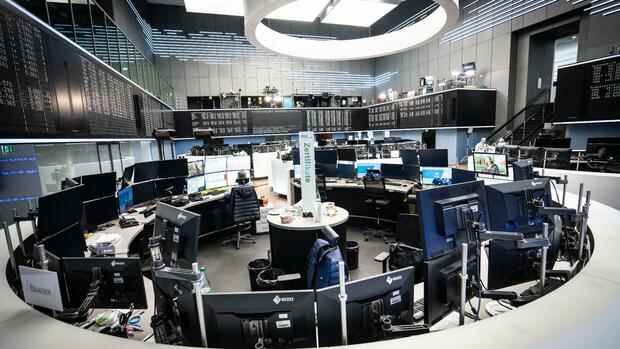A new stock market crash like the one in spring 2020 is unlikely.
(Photo: dpa)
The Dax has lost around 1000 points since its record level. That sounds dramatic at first, but it’s not much more than a mini-correction. The larger price fluctuations are more problematic.
The biggest winning stocks in recovery phases are automobile stocks like Volkswagen and Daimler. Exactly the stocks that investors sell the most when the overall stock markets slide. Conversely, the typical corona profiteers such as the cooking box supplier Hello Fresh lose on good market days. You were recently one of the few winners when the markets went down.
This rapid interplay shows that investors are torn between the hope that the bull market that has been ongoing since spring 2020 and the fear that the mini-correction on the stock markets will initiate a trend reversal. In any case, the carefree times when nothing seemed to shake the stock markets are over.
For months, the Dax, Dow Jones and many other stock market indices climbed new record highs, despite increasing numbers of infections, material shortages and delivery problems. They are making more and more companies look to the future with skepticism.
Top jobs of the day
Find the best jobs now and
be notified by email.
Only Omikron brought the change in mood. But despite all the justified fear of this new Covid-19 variant, it was ultimately only the trigger for a market correction that was long overdue.
Once again, it was the usual pattern: The impacts always come when nobody is expecting them and the majority is prepared for rising prices and is therefore fully invested. Less out of fundamental conviction, but because the steadily rising prices encourage people to buy shares.
In such a mixed situation, every message can trigger a price slide. Namely, if follow-up purchases are missing, then the prices start to slide and other investors get out immediately, especially since they lack the basic conviction anyway. Just as the rally fed itself, so does the downturn. With the difference that it goes down faster because many want to get out at the same time.
These conclusions are not an abstract scenario from textbooks, but a reality experienced in the spring crash a year and a half ago. Back then, the stock exchanges seemed immune to bad corona news that had reached Europe from China before the stock market crashed.
It is unlikely that things will be as bad as in spring 2020, when the Dax lost 40 percent.
First, there is now a vaccine. Second, the vast majority are vaccinated. Third, another partial shutdown of social life and the economy will not be as unprepared for companies as it was a year and a half ago. Fourth, a repetitive event almost never triggers the same fears and price losses as the first time.
Nevertheless, there is a parallel to the spring crash 2020, but it is gratifying. Then as now, the conditions for a prolonged decline in the stock market are lacking. As long as the central banks stick to their zero interest rate policy and, if necessary, initiate the interest rate turnaround in homeopathic doses, stocks will remain the first choice. Only they enable a return in the form of annual dividends and potential price gains.
The prerequisites for a bear market, that is, a prolonged downturn, are also lacking because corporate profits are rising despite all the production and delivery problems. Many catch-up effects will stimulate the economy in 2022.
So the outlook is better than the location. For the stock exchanges, this is good news despite all legitimate concerns about a correction that may not have ended yet.
More: DAX corporations make a profit of 90 billion euros – but worries are growing
